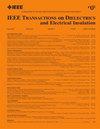Catalytic Effects of Iron and Copper on Degradation of Natural Esters at Different Temperatures
IF 2.9
3区 工程技术
Q2 ENGINEERING, ELECTRICAL & ELECTRONIC
IEEE Transactions on Dielectrics and Electrical Insulation
Pub Date : 2024-09-13
DOI:10.1109/TDEI.2024.3460732
引用次数: 0
Abstract
Natural esters are renewable, highly available, and have a high ignition point. It is considered a suitable alternative to mineral oil in the future development of low-carbon networks and smart grids. The bare silicon steel and copper used in transformers can promote aging of natural esters and shorten their service life. In this article, natural esters containing copper and iron are used for accelerated thermal aging at 100 °C, 120 °C, and 140 °C, and the physicochemical and electrical properties of the natural esters are tested. It is shown that the physicochemical and electrical properties of natural esters are substantially destroyed with increasing temperature. Copper is more catalytic and conductive, resulting in natural esters containing copper having inferior physicochemical and electrical property indices than those containing iron. However, the measured content of iron ions in the oil is much higher than that of copper ions in the oil. It can be seen that the catalytic ability of metals mainly depends on the elemental species rather than the elemental content. The above studies can provide theoretical guidance to reveal the mechanism of deterioration of natural esters by temperature and transition metals in transformers with bare copper and steel.铁和铜在不同温度下对天然酯降解的催化作用
天然酯是可再生的,易获得的,并且有很高的燃点。它被认为是未来低碳网络和智能电网发展中矿物油的合适替代品。变压器中使用裸硅钢和裸铜会促进天然酯的老化,缩短其使用寿命。本文采用含铜和含铁的天然酯在100℃、120℃和140℃下进行加速热老化,并测试了天然酯的理化和电学性能。结果表明,随着温度的升高,天然酯类化合物的物理化学和电学性质基本上被破坏。铜具有较强的催化和导电性,导致含铜天然酯的理化和电学性能指标低于含铁天然酯。但测得的油中铁离子的含量远高于油中铜离子的含量。可见,金属的催化能力主要取决于元素种类而不是元素含量。以上研究可以为揭示裸铜和裸钢变压器中天然酯受温度和过渡金属腐蚀的机理提供理论指导。
本文章由计算机程序翻译,如有差异,请以英文原文为准。
求助全文
约1分钟内获得全文
求助全文
来源期刊
CiteScore
6.00
自引率
22.60%
发文量
309
审稿时长
5.2 months
期刊介绍:
Topics that are concerned with dielectric phenomena and measurements, with development and characterization of gaseous, vacuum, liquid and solid electrical insulating materials and systems; and with utilization of these materials in circuits and systems under condition of use.

 求助内容:
求助内容: 应助结果提醒方式:
应助结果提醒方式:


